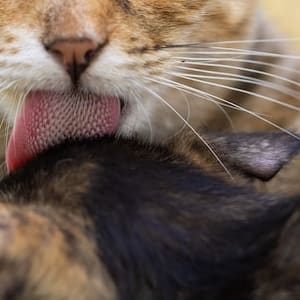lick one’s wounds: Idiom Meaning and Origin
What does ‘lick one's wounds’ mean?
The idiom "lick one's wounds" means to recover from a defeat or setback by reflecting on what happened and preparing to try again.

Idiom Explorer
The idiom "scratch one's own itch" means to take action to resolve one's own problem or fulfill one's own needs without relying on others for help or assistance.
The idiom "scratch an itch" means to alleviate or satisfy a strong desire or need, often by taking action to obtain what is desired.
The idiom "salt in the wound" means to worsen an already difficult or painful situation, often by adding insult to injury.
The idiom "rub salt in the wound" means to worsen a difficult situation by adding insult or further distress to someone who is already suffering or upset.
The idiom "rub salt in someone's wounds" means to deliberately make someone's pain or sadness worse by reminding them of a painful experience or adding insult to injury.
"Rise from the ashes" means to make a strong comeback or recover from a challenging situation or failure.
The idiom "retrace one's steps" means to go back to the same path or route that one has previously taken in order to find something lost, revisit a particular location, or reevaluate one's decisions or actions.
The idiom "rest on one's laurels" means to be satisfied with past achievements and not make any further efforts to achieve more or improve. This can lead to complacency and a decline in performance or success.
The idiom "redeem oneself" means to improve one's reputation or regain respect by doing something good or making up for past mistakes.
Self-Care Recovery
Lick one's wounds is an idiomatic expression that has its roots in the physical act of licking wounds to provide comfort or healing. This figurative phrase is used to describe the behavior of someone who is recovering from a setback or defeat and taking time to reflect and heal before taking action again.
The origin of this idiom dates back to ancient times when animals would literally lick their wounds to clean them, stimulate blood flow, and promote healing. This behavior was observed in various species, including dogs and cats, and it became associated with self-care and rest.
In a metaphorical sense, licking one's wounds refers to the psychological and emotional process of recovering from a failure or setback. It implies taking time to reflect on what went wrong, learning from the experience, and regaining strength and confidence before returning to the battlefield of life.
This idiom is often used in the context of personal or professional setbacks, such as losing a competition, facing rejection, or experiencing a significant failure. It suggests the importance of self-care and self-reflection during challenging times and emphasizes the need to heal emotionally and mentally before moving forward.
While licking one's wounds is an individual and introspective process, it is not necessarily a sign of weakness or surrender. On the contrary, it highlights the resilience and determination of a person who acknowledges their wounds but refuses to be defeated by them. It demonstrates the ability to bounce back and use the lessons learned to emerge stronger and more prepared for future challenges.
This idiom resonates with people from different walks of life, as everyone has experienced setbacks and adversity at some point. It serves as a reminder to prioritize self-care and resilience in the face of challenges, ultimately leading to personal growth and success.
lick one's chops is another idiom related to licking one's wounds. This phrase carries a different meaning, as it refers to someone's anticipation or eagerness to enjoy or benefit from something. It is often used in the context of a delicious meal or a desirable opportunity.
When someone is "licking their chops," they are figuratively salivating and feeling excited or hungry for something good to come. This idiom implies a sense of anticipation and eagerness, which contrasts with the introspection and recovery suggested by licking one's wounds.
on the mend is another idiomatic expression related to the process of recovering and healing. This phrase is typically used to describe someone who is in the process of getting better after an illness, injury, or setback. It implies a gradual improvement and a positive trajectory towards full recovery and wellness.
When someone is "on the mend," they are actively taking steps towards healing and regaining their strength. It reflects a sense of progress and hope, and it is often used to describe someone who is recovering well and is expected to fully recover in the near future.
get well is a commonly used phrase to express well wishes and support for someone who is ill or injured. It is often used in the context of sending a message of encouragement and hoping for a speedy recovery.
When someone says "get well," they are expressing their desire for the person to recover from their ailment or injury and regain their health. It is a simple and straightforward way of conveying good wishes and showing care and concern for the well-being of another person.
get back on the horse that bucked one is another idiom that relates to the process of bouncing back and overcoming setbacks. This phrase is often used in the context of facing and conquering a fear or failure.
When someone is advised to "get back on the horse that bucked them," it means they are encouraged to confront their fears or try again after a failed attempt. It implies the importance of not giving up and returning to the activity or situation that caused the setback, in order to overcome it and find success.
These idioms, including lick one's chops, on the mend, get well, and get back on the horse that bucked one, all have a common theme of recovery, healing, and resilience. They encompass different aspects of the process of dealing with setbacks and adversity, highlighting the importance of self-care, determination, and willingness to try again.
Overall, these idiomatic expressions provide a nuanced understanding of the journey towards success and personal growth. They serve as reminders to prioritize well-being, learn from failures, and never lose sight of the possibility for redemption and triumph.
Example usage
Examples of how the idiom *lick one's wounds* can be used in a sentence:
1. After losing the championship, the team gathered in the locker room to lick their wounds and reflect on what went wrong.
2. The company suffered a major setback, but they are determined to lick their wounds and come back stronger than ever.
3. After a difficult breakup, she took some time to lick her wounds before jumping back into the dating scene.
More "Recovery" idioms



